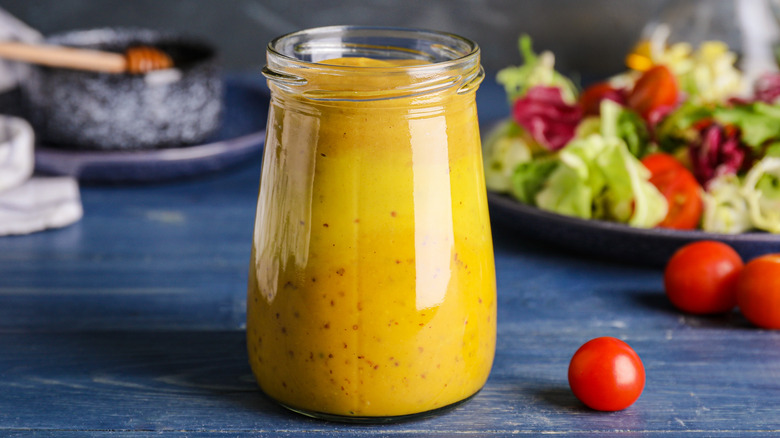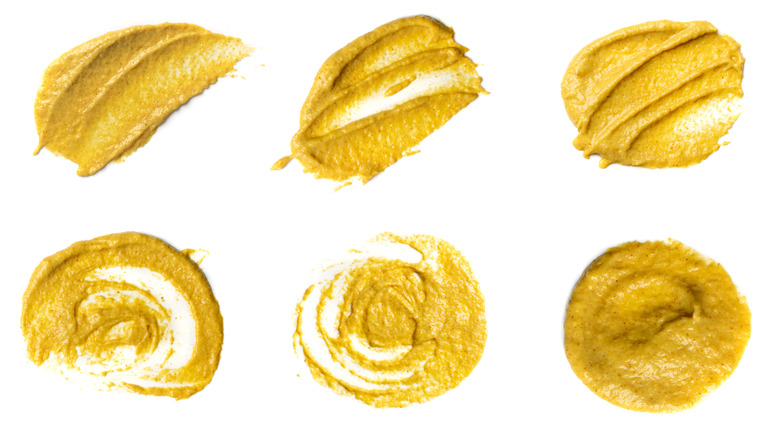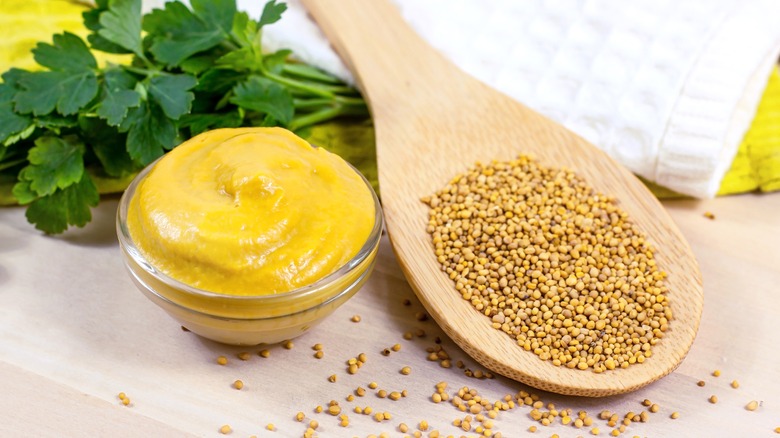Can You Eat Mustard If You're Vegan?
Everyone who's made the omnivore-to-herbivore transition becomes ultra familiar with a seemingly never-ending question: "Is this vegan?" It's always disappointing to find that your favorite foods are off-limits. But similarly, every new vegan or plant-based-curious person is often surprised to find that many popular non-vegan comfort foods and goodies in the U.S. have vegan snack counterparts — or better yet, are already vegan to begin with. Lists of what these non-intentionally vegan foods run abound on the internet, and for good reason. As one Thrillist article suggests, who would have guessed that Doritos Spicy Sweet Chili chips are dairy-free, or that McCormick's Bac'n Pieces don't contain an ounce of pork? But sometimes, looks can be deceiving — even when it comes down to simple condiments.
For instance, mustard seems like a pretty cut-and-dry vegan item. It doesn't seem to contain obvious animal-based ingredients — mustard comes from a plant known, unsurprisingly, as a mustard plant. You can actually eat mustard greens, which make a tasty kick to any salad (via WebMD). Mustard — or "prepared mustard," in reference to the condiment — is made from mustard plant seeds. Healthline explains that only three mustard seeds are used in most recipes: white/yellow, brown, and black.
So far, so plant-based! However, it might not be as simple as it seems. Though the main types of mustard – namely, yellow, honey, Dijon, spicy brown, and wholegrain — find their base in the mustard seed, Healthline notes that not all of them may be suitable for a vegan diet.
Which kinds of mustard aren't vegan friendly?
Honey mustard is not acceptable for most vegan diets, as its foundational ingredients are, as its name suggests, honey and mustard. According to the book "Mustard: A Global History," the ancient tradition of pairing mustard with something sweet dates back as far as the 1300s. Since honey is made by bees, though, it may be considered non-vegan (via Healthline).
Less obvious and a little more ambiguous is Dijon mustard, traditionally made with brown mustard seeds and white wine. The origin story of Dijon mustard is a pretty fun one; per the BBC, ancient Romans planted mustard in the same field as their grapevines because mustard plants provide nutritious phosphorus in the soil for the grapes. One fateful day in the 1700s, a Dijon city local in France made the happy experiment of combining mustard seeds with wine juice, and the rest is history. But unfortunately, according to Inside Science, many wines are filtered through agents derived from animals like cows, chickens, and fish — meaning those agents render Dijon mustard a decidedly non-vegan condiment.
Which mustards are vegan-friendly, and how to make easy vegan mustard at home
While some mustard varieties might be not entirely vegan-friendly, that's not the case generally. Indeed, most mustards are vegan-approved! Healthline's list of the ingredients of the five most common mustard condiments shows that most are vegan. Since only honey mustard and Dijon mustard have animal or insect-derived ingredients, most other mustards are on the table for your enjoyment of plant-based foods (but it's always smart to double-check, just in case).
Even though honey mustard and Dijon mustard seem off-limits on a vegan diet, you don't have to give up your favorite condiments. As pointed out by The Washington Post, there are many honey alternatives — some of which are created specifically with ingredients like apple juice, lemon juice, and sugar — to replace honey in cooking and baking. There are many delicious vegan wines on the market, too, as the BBC explains, so you can enjoy a bottle of Donny Voon or Shinn Estate and make a delicious vegan Dijon mustard at home (via The New York Times).
By eating more mustard, you will be following in the footsteps of popes and kings alike; according to The Good Life France, Pope John XXII and King Louis XI cherished this tangy condiment so much that they created positions like "official mustard maker" or never left home without a jar, respectively.


